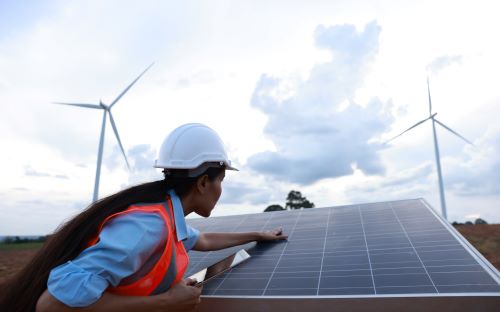As workplaces re-open, many Indian businesses are adopting a hybrid model of office and home working, and surveys suggest employees feel this will improve their work-life balance and wellbeing.
Features
The freedom to flex
Although the threat of a third wave still looms large with the emergence of a new AY.4.2 variant of Covid-19, the growing roll-out of vaccinations is encouraging Indian businesses to bring their employees back to the office and resume normal business operations.
A survey by jobsite Indeed revealed that almost all Indian employer and employee respondents (94 per cent and 87 per cent respectively) want people coming in to work to be vaccinated with at least a single dose, while a Deloitte survey found an overwhelming majority of Indians (84 per cent) feel it is safe to return to their workplaces.
 Photograph: iStock Deepak Sethi
Photograph: iStock Deepak Sethi
Although government officials warned the country not to lower its guard against Covid-19 during the festive season, the good news is that increasingly Indians feel it’s safe to return to the office. This is in part the result of the country’s vaccination numbers passing one billion doses, and Covid infections dropping sharply. Cases have been hovering around the 12,000 mark – down from a peak of 400,000 a day during a devastating second wave that swept the nation in April and May.
Tech and financial sector encourages return to work
The technology and financial sector – such as banks, other non-banking financial businesses, fintech and IT companies – is at the vanguard of the move to get employees back into the office.
“As on date, all our offices are working at 100 per cent manpower in line with the directives issued by the respective state governments,” said Renu Sud Karnad, managing director of HDFC Ltd, one of India’s leading housing finance companies. “We have allowed expectant mothers, female employees with children below one year of age, employees above 65 years of age, employees with co-morbidities and employees coming from any containment zones as defined by the authorities to continue to work from home.”
Kotak Mahindra Bank, meanwhile, expects that 90 per cent of its staff, who are fully jabbed, will be back in the office by November or December.
Sukhjit Pasricha, the bank’s president and group chief human resource officer, said that in branches and other customer-facing roles, Kotak is close to reaching 100 per cent staffing levels.
Leading IT companies, including Tata Consultancy Services (TCS), Infosys, Wipro, and HCL Technologies, are at various stages of outlining plans to resume business as usual. Many of these tech giants have also conducted dedicated vaccination campaigns for their employees and the families of their staff.
TCS, India’s largest IT outsourcing company, is encouraging its employees to return to the office by the end of 2021. Currently, about five per cent of the IT giant’s associates are working in the office.
Milind Lakkad, executive vice president and chief human resources officer at TCS, said that since 70 per cent of the company’s staff are double vaccinated, and 95 per cent have received at least one dose, the business will gradually get its workforce back into offices “by the end of this year”. TCS expects a majority of its employees to be double jabbed by then.
“We are committed to the ‘25/25 model’ but before transition to the model, we need to start by getting people back to the office and gradually evolve to 25/25,” TCS said.
Under the model, by 2025, no more than 25 per cent of the company’s employees will need to work from the office at any given point, and an employee will not need to spend more than 25 per cent of their time in the office.
According to TCS, “hybrid models of work are here to stay. In the new ‘Future Of Work’, both the physical office and remote working will play an integral part. Eventually, everybody will have to come to office for a period and at the same time, they will have the flexibility to work from home. At the end, whatever we do, it will be fully taking into consideration employees’ safety, health, and well-being.”
Growth in hybrid working
Infosys, India’s second-biggest provider of digital outsourcing services to businesses, is also preparing to adopt a hybrid working model. With over 86 per cent of the tech firm’s employees having received at least one dose of the vaccine, the company is now preparing to embrace the hybrid approach to working practices. “We have equipped employees with the resources they need to be productive, cyber-secure, stay connected, and maintain a work-life balance,” said the company’s CEO, Pravin Rao. “Our talent strategy also factors in expanded hiring pools that include new communities and work locations.”
Another major IT company, HCL Technologies, is also simultaneously calling its employees back to the office and adopting a hybrid working model. The company has asked its senior management to come to the office at least twice a week while others can attend once a week, depending on the requirements of the work and the business. “We do expect momentum [around returning to work] to increase by the end of this calendar year,” said Apparao VV, HCL’s chief human resources officer. “This is the policy that we have at this point of time.”
With many employees still not completely convinced about the level of risk from Covid-19 in offices, some companies have asked their top management and regional leaders to start attending the workplace to encourage other staff to return.
Rishad Premji, chairman of IT business Wipro, recently said the company’s “leaders” will start returning to the office. “After 18 long months, our leaders @Wipro are coming back to office, starting Monday (twice a week). All fully vaccinated, all ready to go – safely and socially distanced,” he said in a tweet.
Double-jabbed Wipro employees returned to work in September. The IT major has also adopted a hybrid work model where fully vaccinated employees report to the office for two days every week.
Premji also shared a video on Twitter showing Covid-19 safety protocols, such as temperature checks and QR code scans, being observed by employees returning to the workplace.
Although Facebook CEO Mark Zuckerberg predicted that 50 per cent of the company’s employees could be working remotely within the next five to ten years, the social media company is planning a staggered re-opening of its offices in India, which began in October. In the US, though, Facebook will only decide whether or not to re-open offices in January next year. “We are currently on a mandatory work-from-home,” said a Facebook spokesperson. “But starting October, we will allow 25 per cent of the staff to return to the Gurugram office.”
Top multinational corporations and domestic companies are also getting ready to bring back fully vaccinated employees.
South Korean electronics giant Samsung, which covered the vaccination costs for over 50,000 eligible employees and beneficiaries in India, has increased the cap on employees in their large corporate offices to 33 per cent, an increase from the 10 per cent level set when the lockdown was lifted. To minimise the risks from Covid-19, rosters of staff are drawn up two weeks in advance and employees must have an antigen test each time they enter the office.
Meanwhile, the world’s biggest food company, Nestle, is allowing its staff to choose between returning to offices or continuing to work from home for the next couple of months.
“Employees can choose to work from office or continue to work for home; it’s their choice,” said Suresh Narayanan, chairman of Nestle. “For the next couple of months, this will be the case, after which we will take a further call.”
In the headquarters of Birla in Mumbai, senior managers are already attending the office, while other members of the workforce who have been fully vaccinated are coming into work in batches. Fully vaccinated employees at ITC Limited are also attending the office in greater frequencies.
However, fast-moving consumer goods giant Godrej Consumer Products is allowing its employees the flexibility to work from home, irrespective of whether they have been fully or partly vaccinated.
Meanwhile, Deloitte has asked employees to come to the office only when necesary and is opening its offices in a phased manner. SV Nathan, chief talent officer at Deloitte India, said: “The popular pulse certainly favours hybrid working.”
Hybrid working ‘will improve work-life balance’
Nathan’s statement rightly captures the sentiment of the Indian workforce, as revealed by LinkedIn’s Future of Work Study 2021. This research, which surveyed 1,108 people aged 16 to 68, found that nearly nine in 10 (86 per cent) think hybrid working will have a positive impact on their work-life balance. When asked why, 48 per cent said a hybrid model will allow them to spend equal time on their personal goals and professional lives.
The survey also suggests professionals are placing a greater emphasis on their wellbeing, with 50 per cent stating a good work-life balance is just as important as their salary.
Sashi Kumar, head of sales at Indeed, said: “The common trend across employees and employers is that a majority of both employers (52 per cent) and employees (61 per cent) are in favour of hybrid work models, as compared with either going to work every day or working from home every day. The future of work is definitely hybrid.”
In Mumbai, Karuna Sharma, a chartered accountant at a consultancy firm, couldn’t agree more. She enjoys the flexibility of her new hybrid schedule as she now only has to travel to the office once or twice a week. “Since my company has formally committed to a ‘hybrid’ working arrangement, I won’t come in regularly until there is a critical mass of people here,” she said. The commute to her office takes her at least 50 minutes on public transport and she still has a “nagging concern” about the risks from Covid-19.
“The trains are getting busier with more and more people returning to work,” she says. “But I think I’ve got over the fear of catching the virus now that I’m fully jabbed.”


FEATURES

India’s path to net zero: a work in progress
By Orchie Bandyopadhyay on 08 April 2025
India is implementing a variety of clean energy measures to hit its target of net zero greenhouse gas emissions by 2070, including plans to rapidly scale up the generation of nuclear power. However, climate experts say significant finance will be required from developed countries to phase out coal power, accelerate renewables deployment and expand the national electricity grid.

Too hot to handle: early arrival of heatwaves in India sparks calls for action to protect workers and the public
By Orchie Bandyopadhyay on 08 April 2025
Temperatures in India in February 2025 were the hottest since records began over a century ago, prompting warnings the country needs to urgently step up efforts to protect both workers and the general population from the health risks posed by extreme heat and humidity.

